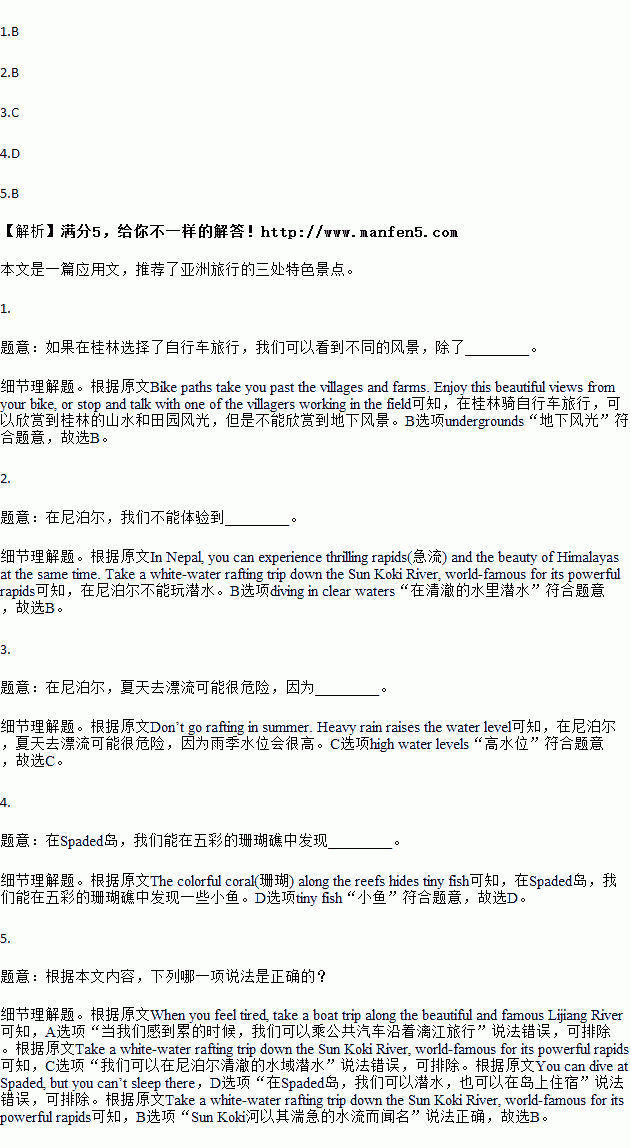题目内容
Do you want to travel in countries in Asia? You don’t have to travel very far. Follow us,
and you can enjoy these Asian adventures.
Activities | Introduction | Advice |
Cycling in Guilin, China | Get around the city by cycling through Guilin, Guangxi Province. Mountains rise straight up, creating the only beauty. Bike paths take you past the villages and farms. Enjoy this beautiful views from your bike, or stop and talk with one of the villagers working in the field. | When you feel tired, take a boat trip along the beautiful and famous Lijiang River. |
White-water rafting in Nepal | In Nepal, you can experience thrilling rapids(急流) and the beauty of Himalayas at the same time. Take a white-water rafting trip down the Sun Koki River, world-famous for its powerful rapids. | Don’t go rafting in summer. Heavy rain raises the water level. |
| Go diving in the clear waters around Spaded, an island in Malaysia, and discover an underground world. You’ll see large sea animals swimming along. The colorful coral(珊瑚) along the reefs hides tiny fish. | You can dive at Spaded, but you can’t sleep there. The island is a protected park, but you can stay on one of the nearby islands. |
1.If we follow the cycling trip in Guilin, we can see different views except _________.
A.farmers B.undergrounds C.mountains D.crops
2.We cannot experience _________ in Nepal.
A.thrilling rapids B.diving in clear waters
C.the beauty of the Himalayas D.a white-water rafting trip
3.Going rafting may be dangerous in summer in Nepal because of _________.
A.too many tourists B.high temperature C.high water levels D.dry weather
4.We can find _________ hide in the colorful coral along the reefs in Spaded.
A.large sea animals B.a boat C.an island D.tiny fish
5.Which of the following is true according to the passage?
A.We can take a bus trip along Lijiang River when we feel tired.
B.The Sun Koki River is famous for its powerful rapids.
C.We can go diving in the clear waters in Nepal.
D.We can dive and sleep at Spaded at the same time.
 阅读快车系列答案
阅读快车系列答案阅读短文,根据文章内容,完成下列表格。每空一词。
Some etiquette(礼仪)in modern life
Do you often use a cell phone? Do you take the subway to school every day? These items make our modern life easier. But do you know how we should behave properly while using them? The following suggestions might be helpful.
For cell phone users
◆Keep your voice down when you make a phone call in public. Shouting on the phone may make others feel uncomfortable. And you’d better not use it during an appointment(约会).
◆Stop sending messages or playing games with your cell phone at a dinner or a party. It’s a good time to communicate(交流)with your family and friends.
◆Don’t make or answer a call while driving. It is not only very dangerous for both you and your passengers but also against the law.
For subway passengers
◆You are supposed to wait in line while buying tickets and getting on the subway.
◆You’re not allowed to eat, drink or smoke on the subway train. The smell and noise may trouble others. It’s our duty to keep the train clean and tidy. Besides, smoking is bad for health.
◆ You can’t take pets on the train. As we all know, animals may spread diseases(传播疾病)and get the train dirty.
◆ You’d better not lie across the subway seats even if the train isn’t crowded. Offering your seat to someone who needs it is regarded as good manners.
Items | What we should do | What we shouldn’t do |
Cell phoneusers | Keep your 1.down in public | ● Don’t send messages or play games at a dinner or a party. ● Don’t make or answer a 2.while driving. |
Subway passengers | ● Wait in line ●Keep the train clean and 3. ●Offer your seat to someone who needs it. | ● Don’t eat, drink or 4.on the train. ●Don’t take 5.on the train. ● Don’t lie across the subway seats. |
A national survey was carried out in Australia on how children aged eight to sixteen read news. The survey found children as young as eight were interested in news. However, the spread of wrong information makes it difficult for children to understand events. The survey also found only one-third of young people felt they could tell whether news they read was real or not.
Here are what adults can do to help children critically (批判地) think about the news.
To help decide if a source (来源) can be trusted, they can ask the following questions. Is it clear who created this news? Viewers need to be able to ask the person or organization about why and how they created the story. Does it present facts straight or does it include opinions? If opinions are presented as facts, this may lead to wrong ideas. Does it include all the important people? If a story speaks up for organizations or groups of people, they should have the chance to reply to these opinions.
Some media may make use of people’s feelings. Discussing how children feel about news helps them decide which news programs to watch. Research shows sensationalist (耸人听闻的) news titles can receive more clicks online. Adults can also talk to children why people spread wrong information, such as changing people’s mind on who to vote for or attracting more clicks.
News media talk about events in different ways. Parents and teachers can help children be careful while reading stories. In some stories people can’t present their ideas honestly. In these cases, it’s best to find other news sources to consider how they are reporting the story. Discussing what children think of the news can help build their critical thinking skills.
News that can be trusted is important to society. People depend on it to help make decisions in lives. Seeing how wrong information is different from real news is a challenge for everyone at present. Listening to children’s experiences is a valuable starting point for improving their critical thinking abilities.
Ways to Help Children Think Critically about News | |
Results of the survey | ? Children aged eight have shown an 1.in news. ? Two-thirds of young people have 2. telling whether news is real or not. |
3. for adults to take | Help decide if a source can be 4. in ? Find out the creators of the news. ? Make sure that news should avoid 5. opinions as facts. ? Check whether all the important people are 6. in the story. |
Explain why some media make use of people’s feelings ? Attract much 7.with sensationalist news titles. ? Make a difference to votes by spreading wrong 8.. | |
Discuss how news media report the stories differently ?Compare stories they read with other stories from different news sources to consider whether they are reported honestly. ? Talk with children about what they 9. of the news. | |
Conclusion | Reading news critically is 10. but challenging to everyone at present. Adults need to start from listening to children’s experiences. |


 Scuba diving in Malaysia
Scuba diving in Malaysia
